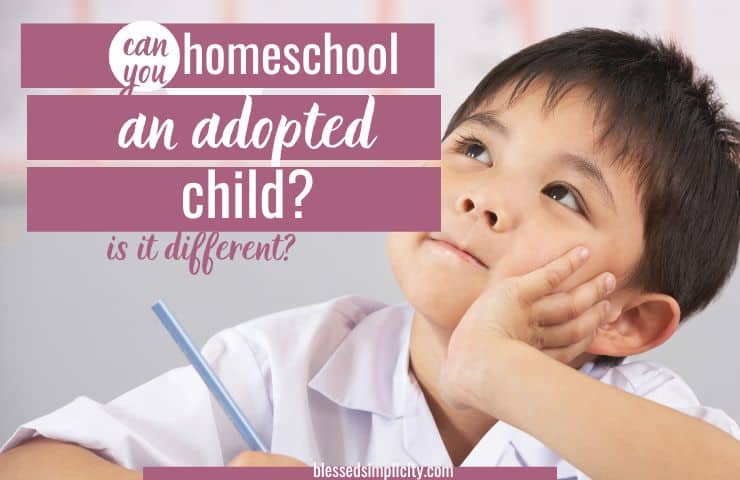Can you homeschool an adopted child?
Can you homeschool an adopted child? The short answer is yes, but here are some tips and things to think about before choosing this method of education plus, some other adoption resources from parents who have done it successfully.

*This post contains affiliate links. Please see full disclosure policy below.
Can you homeschool an adopted child?
Once a child is legally adopted, they are your child and you can make all decisions about the child’s care, including educational decisions. You can choose to homeschool your child if you want to, as long as you abide by the homeschooling laws in your state.
If you’re a parent who has recently adopted a child, you may be considering homeschooling as an educational option. After all, it can be difficult to place your trust in someone else to care for and educate your child when you’re just getting to know each other. And homeschooling offers a unique opportunity to bond with your child and tailor their education to their individual needs and interests. But is homeschooling the right choice for your family? Here’s what you need to know.
Is Homeschooling Legal in Your State?
The first thing you need to do is learn about the homeschooling laws in your state. Each state has different laws and regulations surrounding homeschooling, so it’s important that you familiarize yourself with the requirements where you live. In some states, you may need to register as a private school or obtain a teaching certificate; in others, the only requirement is that you notify the school district of your intention to homeschool. You can find out more about your state’s specific requirements at the Homeschool Legal Defense Association website.
Consider your Child’s Developmental Needs
Many adopted children, especially those adopted through the foster care system, experience some developmental delays. These delays often require therapies such as Occupational, Physical, and Speech Therapy along with traditional education in order to help the child succeed. If you homeschool, you will be responsible for finding therapists and getting your child to therapy visits each week.
What are your child’s educational needs?
Many children, including adopted children, have special educational needs. Sometimes they have learning delays and even learning disabilities. If you choose to homeschool, you will need to identify those needs and choose curriculum and teaching methods that will help your child deal with and overcome those educational challenges.
What Are Your Motivations for Homeschooling?
It’s also important to take some time to think about why you want to homeschool your child. Are you concerned about the quality of the public schools in your area? Are you worried about bullying or peer pressure? Or are you simply looking for a more intimate learning environment that will allow your child to thrive? Knowing your motivations will help you decide whether homeschooling is the right choice for your family.
What if my child is still in foster care?
Until you child is legally adopted, your state agency is responsible for making all educational decisions for your child. Unfortunately, it is not always easy to arrange to homeschool a child until the adoption is final, however, there are cases where it is possible to homeschool a foster child.
What About Socialization?
One of the most common concerns people have about homeschooling is socialization. Will homeschooled children be able to interact successfully with their peers? The answer is yes—but it’s important to remember that socialization isn’t just about interacting with other kids. It’s also about learning how to communicate and cooperate with people of all ages, which is something that homeschooled children have plenty of opportunities to do. In fact, many people argue that homeschooled children are actually better-socialized than their peers because they’re not confined to a classroom all day long and instead have the chance to interact with people of all ages on a daily basis.

Find Support From Other Adoptive Families
Seek out support from other adoptive families who are homeschooling their children. They can offer advice and guidance based on their own experiences. Be sure to ask about any learning challenges their children have and talk about any past trauma and how it effects the child’s educational abilities.
Homeschooling your adopted child can be a great way to bond and build trust while still providing them with a quality education tailored to their individual needs. But before making the decision to homeschool, it’s important that you familiarize yourself with the requirements in your state and think carefully about why you want to homeschool.
Of course, every child is different, and every family’s situation is unique. There is no one-size-fits-all answer when it comes to homeschooling. Some adopted children may thrive in a traditional school setting, while others may do better in a homeschool environment. It’s important to do what’s best for your child and your family.
More Homeschooling Posts
- Why Large Families Choose Homeschooling
- Do Parents get paid to Homeschool?
- Gifts for Homeschool Moms
- How to Create a Homeschool Schedule
- How to Choose a Homeschool Curriculum




